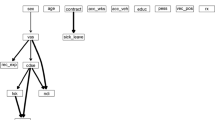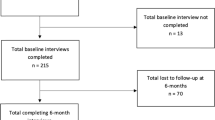Abstract
Cross-sectional cohort study: to examine concurrent expectations and coping style for whiplash injury in injury-naive subjects in Germany. Studies suggest the recovery rate from whiplash injury may be faster in Germany than in Canada. Canadians have a high expectation for chronic pain following whiplash injury and Germans do not. Expectation of recovery not only predicts recovery in whiplash victims but is also known to correlate with coping style. The Vanderbilt Pain Management Inventory was administered to university students and staff in Germany. Subjects who had not yet experienced whiplash injury were given a vignette concerning a neck sprain (whiplash injury) in a motor vehicle collision and were asked to indicate how likely they were to have thoughts or behaviours indicated in the coping style questionnaire. Subjects also completed expectation questionnaires regarding whiplash injury. Sixteen percent of subjects held an expectation of chronic neck or back pain after whiplash injury. The mean active coping style score was 27.4 ± 3.6 (40 is the maximum score for active coping). The mean passive coping style score was 27.0 ± 6.3 (50 is the maximum score for passive coping). Coping style scores and patterns were not different from those previously observed in Canadian studies, but there was no correlation between expectations and coping style among German subjects, a finding that differs from Canadian studies. Although expectations and coping styles may interact or be co-modifiers in the outcomes of whiplash injury in Canadian whiplash victims, in Germany, despite having similar coping styles to Canadians, the lack of expectation for chronic pain may be protective from the effect of passive coping styles. Further studies of coping style as an aetiologic factor in the chronic whiplash syndrome are needed.
Similar content being viewed by others
References
Spitzer WO, Skovron ML, Salmi LR, Cassidy JD, Duranceau J, Suissa S et al (1995) Scientific monograph of the Quebec task force on whiplash-associated disorders. Spine 20(suppl 8):1S–73S
Holm LW, Carroll LJ, Cassidy JD, Hogg-Johnson S, Côté P, Guzman J et al (2009) The burden and determinants of neck pain in whiplash-associated disorders after traffic collisions: results of the bone and joint decade 2000–2010 task force on neck pain and its associated disorders. J Manipulative Physiol Ther 32(2 Suppl):S61–S69
Ferrari R, Schrader H (2001) The late whiplash syndrome. A biopsychosocial approach. J Neurol Neurosurg Psychiatry 71:722–726
Richter M, Ferrari R, Krettek C, Otte D, Kuensebeck HW, Blauth M (2004) Correlation of clinical findings, collision parameters, and psychological factors in the outcome of whiplash-associated disorders. J Neurol Neurosurg Psychiatry 75:758–764
Bonk A, Ferrari R, Giebel GD, Edelmann M, Huser R (2000) A prospective randomized, controlled outcome study of two trials of therapy for whiplash injury. J Musculoskelet Pain 8:123–132
Schnabel M, Ferrari R, Vassiliou T, Kaluza G (2004) A randomized, controlled outcome study of active mobilization versus collar therapy for whiplash injury. Emerg Med J 21:306–310
Pieske O, Weinhold T, Buck J, Piltz S (2010) Seniority of the first-treating doctor does not influence the outcome of acute whiplash injury: a prospective cohort study. Eur Spine J 19(10):1627–1634
Ferrari R, Russell AS (2008) Whiplash: social interventions and solutions. J Rheumatol 35:2300–2302
Suissa S, Giroux M, Gervais M et al (2006) Assessing a whiplash management model: a population-based nonrandomized intervention study. J Rheumatol 33:581–587
Brison RJ, Hartling L, Pickett W (2000) A prospective study of acceleration-extension injuries following rear-end motor vehicle collisions. J Musculoskelet Pain 8:97–113
Cassidy JD, Carroll L, Cote P et al (2000) Effect of eliminating compensation for pain and suffering on the outcome of insurance claims for whiplash injury. N Engl J Med 342:1179–1186
Phillips LA, Carroll LJ, Cassidy JD, Côté P (2010) Whiplash-associated disorders: who gets depressed? Who stays depressed? Eur Spine J 19(6):945–956
Cote P, Cassidy JD, Carroll L, Frank JW, Bombardier C (2001) A systematic review of the prognosis of acute whiplash and a new conceptual framework to synthesize the literature. Spine 26(19):E445–E458
Carroll LJ, Holm L, Ferrari R, Ozegovic D, Cassidy JD (2009) Recovery in whiplash-associated disorders: do you get what you expect? J Rheumatol 36:1063–1070
Carroll LJ, Cassidy JD, Côté P (2006) The role of pain coping strategies in prognosis after whiplash injury: passive coping predicts slowed recovery. Pain 124(1–2):18–26
Buitenhuis J, Spanjer J, Fidler V (2003) Recovery from acute whiplash: the role of coping styles. Spine 28:896–901
Ferrari R, Russell AS (2010) Correlations between coping styles and symptom expectation for whiplash injury. Clin Rheumatol 29(11):1245–1249
Ferrari R, Lang C (2005) A cross-cultural comparison between Canada and Germany of symptom expectation for whiplash injury. J Spinal Disord Tech 18:92–97
Brown GK, Nicassio PM, Wallston KA (1989) Pain coping strategies and depression in rheumatoid arthritis. J Consult Clin Psychol 57:652–657
Härkäpää K (1991) Relationships of psychological distress and health locus of control beliefs with the use of cognitive and behavioral coping strategies in low back pain patients. Clin J Pain 7:275–282
Rosenstiel AK, Keefe FJ (1983) The use of coping strategies in chronic low back pain patients: relationship to patient characteristics and current adjustment. Pain 17:33–44
Barron CR, Foxall MJ, Houfek JF (2005) Coping style and women's participation in breast and gynecological screening. Health Care Women Int 26(3):247–261
Park CL, Adler NE (2003) Coping style as a predictor of health and well-being across the first year of medical school. Health Psychol 22:627–631
Jones T, Rapport L, Hanks R, Lichtenberg P, Telmet K (2003) Cognitive and psychosocial predictors of subjective well-being in urban older adults. Clin Neuropsychol 17:3–18
Ramaekers D, Ector H, Demyttenaere K, Rubens A, Van de Werf F (1998) Association between cardiac autonomic function and coping style in healthy subjects. Pacing Clin Electrophysiol 21:1546–1552
Castro WH, Meyer SJ, Becke ME, Nentwig CG, Hein MF, Ercan BI et al (2001) No stress–no whiplash? Prevalence of "whiplash" symptoms following exposure to a placebo rear-end collision. Int J Leg Med 114:316–322
Disclosures
None.
Author information
Authors and Affiliations
Corresponding author
Rights and permissions
About this article
Cite this article
Ferrari, R., Pieschl, S. An examination of coping styles and expectations for whiplash injury in Germany: comparison with Canadian data. Clin Rheumatol 30, 1209–1214 (2011). https://doi.org/10.1007/s10067-011-1736-z
Received:
Revised:
Accepted:
Published:
Issue Date:
DOI: https://doi.org/10.1007/s10067-011-1736-z




